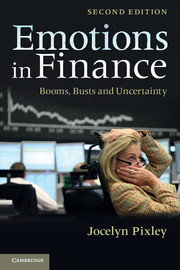Book contents
- Frontmatter
- Contents
- Acknowledgements
- Abbreviations
- Interviews
- Introduction
- 1 Modern money, modern conflicts
- 2 Corporate suspicion in the kingdom of rationality
- 3 Financial press as trust agencies
- 4 Required distrust and the onus of a bonus
- 5 Managing credibility in central banks
- 6 Hierarchies of distrust from trust to bust
- 7 Overwhelmed by numbers
- 8 The time-utopia in finance
- 9 Taming the god of opportunism
- References
- Index
7 - Overwhelmed by numbers
Published online by Cambridge University Press: 05 June 2012
- Frontmatter
- Contents
- Acknowledgements
- Abbreviations
- Interviews
- Introduction
- 1 Modern money, modern conflicts
- 2 Corporate suspicion in the kingdom of rationality
- 3 Financial press as trust agencies
- 4 Required distrust and the onus of a bonus
- 5 Managing credibility in central banks
- 6 Hierarchies of distrust from trust to bust
- 7 Overwhelmed by numbers
- 8 The time-utopia in finance
- 9 Taming the god of opportunism
- References
- Index
Summary
Financial organisations act, understandably, on past data. But the obsession to extrapolate is like a collective nervous tic, a giant embarrassment writ large in standard operating procedures and TV talking heads. Numbers can be a way of ‘seeming to decide’. Bets are placed on trends; none can be predictive, some are illogical. Despite extravagant failures, the sector's trust in numbers and repression of uncertainty through redefinition grows. This chapter is about the trust – in risk and hopes for predicting – among banks and credit-raters, accountancy and insurance firms, money market actors and forecasters. These enterprises grew from many sources and each treats ‘risk’ very differently. I suggest that these variations in risk show the extreme thinness of speculative models in finance. However, assurances to others are often commodities. If trust in numbers is saleable, it is as mutually corruptible and untrustworthy as we saw in the distrust ‘hierarchy’ of the last chapter. Blame-passing circulates. While ceteris paribus is the ‘fine print’ clause (vis-à-vis trusting clients), here we look at the credibility of assuming the past will resemble the future. It is not clear who trusts that, as a nervous tic suggests.
The perfect calculating machine: the firm
Why is information so important and what do numbers mean? Various ideas in an individualist framework said information ‘explained’ the existence of corporations. Markets are near perfect but firms have a more perfect function: they use information with ‘guile’ better than individuals. This opinion dismisses other disciplines and institutional economics from Veblen and Schumpeter. It avoids money's social nature, and is only worth mentioning because it justified firms like Enron – up to its fraud – and banks and regulations incorporated its baleful effects. Oliver Williamson queried whether opportunistic agents (individuals), described in orthodox models, were the sole coordinators of economic activity (the invisible hands via market price signals). He said capitalist firms exist (1991a), purely to minimise the transaction costs of market exchanges. Apparently this is both the origin and function of ‘opportunistic firms’ – they gain greater profits than opportunistic individuals. Market failures from ‘hazards’ and externalities like ‘information asymmetries, uncertainty…have transaction cost origins’ which firms – aka ‘hierarchies’ – can overcome (Williamson 1991a: 4). Uncertainty is an issue only because all agents behave opportunistically with ‘guile’ since ‘contract as promise is naïve’. Organisations have greater strengths than individuals to place what Williamson calls ‘crafted safeguards’ against opportunism.
- Type
- Chapter
- Information
- Emotions in FinanceBooms, Busts and Uncertainty, pp. 192 - 223Publisher: Cambridge University PressPrint publication year: 2012



